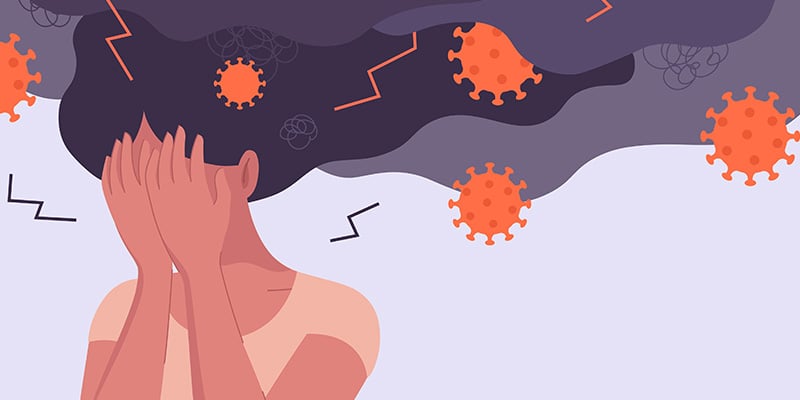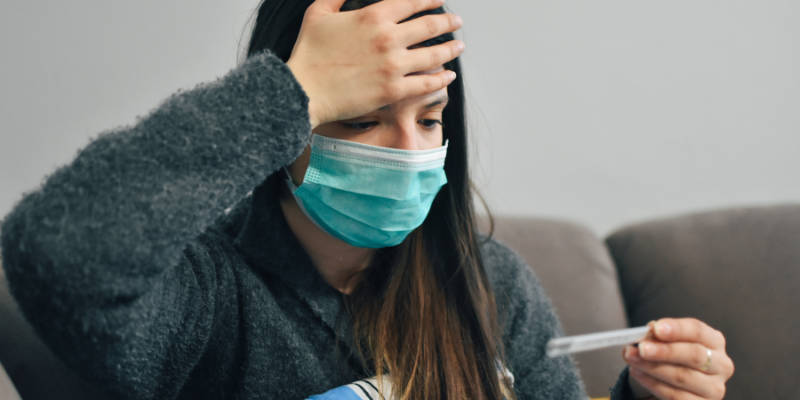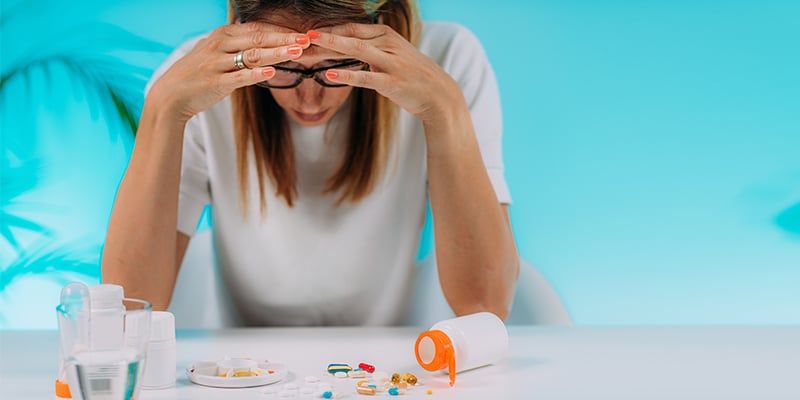
Approximately 90 million Americans have had COVID-19, and that number keeps rising as variants of the virus produce even more cases. At this stage in the pandemic, you might assume that getting infected will only make you feel mildly ill for a short while. That’s what former tennis pro Tara Snyder thought.
In an episode of Scan My Brain, she told Daniel Amen, MD, that she was diagnosed with COVID and had relatively mild symptoms. About 2-3 weeks later, however, she developed brain fog and memory issues, and she suffered from insomnia and a disturbing loss of pleasure. Her depression became so severe, she began having suicidal thoughts. “It was like a snowball effect,” she says to Dr. Amen.
Snyder isn’t alone. According to a 2022 study in BMJ, people who have had COVID—whether serious or mild infections—are at significantly higher risk of experiencing mental health issues, including anxiety, depression, suicidal ideation, sleep disturbances, and cognitive decline.
One of the authors of this study says that in the U.S., over 2.8 million new cases of mental health disorders can likely be tied to COVID-19 infections. The actual number is probably much higher as stigma surrounding mental illness continues to prevent some people from seeking treatment. And these emotional and cognitive issues also lead to increased use of prescription medications, opioids, and other drugs and alcohol. The researchers found that these issues can remain a year after infection.
If you have had COVID-19 or you test positive for it, it’s important to be aware of any subsequent changes in your emotional health, cognitive function, alcohol consumption, or drug use. When these changes develop weeks or months after recovery from COVID illness, many people do not make the connection. Recognizing these changes and seeking treatment early can be the key to avoiding lasting post-COVID mental health consequences.
People who have had COVID—whether serious or mild infections—are at significantly higher risk of experiencing mental health issues. Click To TweetPOST-COVID-19 MENTAL HEALTH CONSEQUENCES
The BMJ study mentioned earlier joins a growing body of scientific evidence pointing to an uptick in mental health problems and brain-related issues following infection from COVID-19. These issues are considered to be symptoms of long COVID, a condition also referred to as COVID-Brain. Overall, the study found that those who have recovered from COVID are 60% more likely to struggle with these issues compared with people who have not been infected. Specifically, compared with people who have not been infected, those who have contracted COVID experienced the following increases:
- Depression or stress-related disorders: nearly 40% increase
- Anxiety disorders: 35% increase
- Sleep disorders: 41% increase
- Suicidal thoughts: 46% increase
- Neurocognitive decline: 80% increase
Note that neurocognitive decline includes memory problems, confusion, trouble concentrating, and other issues that are collectively known as brain fog.
These issues were also linked to increased use of medications as well as opioids and other substances:
- Anti-anxiety pills (benzodiazepines): 65% increase in use
- Antidepressants: 55% increase in use
- Opioid use disorders: 35% increase
- Alcohol use disorder or non-opioid drug abuse: 20% increase
Other research, including a 2020 study and a 2021 study, has also found increased rates of other mental health disorders following COVID infections, including:
As more research emerges, ties to other emotional, behavioral, or cognitive issues may be discovered.
HOW COVID-19 IMPACTS MENTAL HEALTH AND THE BRAIN
How COVID-19 impacts the brain, emotional health, and cognitive function remains unclear, but experts suggest that inflammation caused by the infection may be a factor. Inflammation is a known contributor to certain mental health conditions, such as depression. Other research shows that the virus can cross the blood-brain barrier and invade the brain, disrupting activity.
At Amen Clinics, brain SPECT imaging scans on patients who have had COVID-19 show distinct changes in brain activity. SPECT is a nuclear medicine technology that measures blood flow and activity in the brain. Before-and-after COVID brain scans of Amen Clinics patients show heightened activity in the limbic system, the brain’s emotional centers, following COVID.
The limbic system is a brain region that is involved with emotions and bonding, among other functions. On SPECT scans, overactivity in the limbic system is associated with a greater likelihood for low moods, negativity, trouble sleeping, and major depressive disorder.
TREATING POST-COVID MENTAL HEALTH PROBLEMS
If issues like anxiety, depression, or brain fog arise after recovering from a COVID-19 infection, don’t wait and hope it will simply resolve on its own. Seeking treatment early can help you get back to feeling like yourself again faster. Brain SPECT imaging can be beneficial in providing answers related to neuropsychiatric conditions. Seeking help from a functional medicine professional, also known as integrative medicine physicians, can be helpful in finding biological contributors—such as medical issues, infections, or inflammation—to your symptoms.
For Snyder, visiting Amen Clinics and seeing her brain scan offered hope. With a tailored treatment plan, her mood, memory, and cognitive function improved. Her follow-up brain scan was so much better, Snyder told Dr. Amen, “You’ve been my brain angel.”
5 NATURAL STRATEGIES TO MANAGE POST-COVID MENTAL HEALTH ISSUES
If you’re experiencing emotional issues or brain fog, you can get started immediately with simple yet potent lifestyle changes. Try these feel-better-fast strategies:
1. Eat anti-inflammatory foods.
Avoid pro-inflammatory foods, such as sugar, refined carbohydrates, and sodas. Stick with anti-inflammatory foods like organic vegetables and fruits, foods high in omega-3 fatty acids (like salmon and mackerel), and spices like turmeric.
2. Fuel your brain.
Taking nutritional supplements that nourish the brain can make a big difference. For example, to calm anxiousness and promote relaxation, try GABA, magnesium, or l-theanine. Saffron has been found to have antidepressant effects. If focus is a problem, consider taking rhodiola, ashwagandha, or green tea extract.
3. Move a little.
Exercise is a well-known mood booster, but be careful not to overdo it while recovering from COVID. Take it easy with gentle movements like tai chi, yoga, or walking.
4. Get your zzz’s.
Practice good sleep hygiene so you can get the 7-8 hours of quality rest you need each night. Ditch your tech devices at least 1 hour before bedtime and keep your room cool and dark to promote sleep.
5. Train your thoughts.
Having a lot of automatic negative thoughts (ANTs) can be a lasting consequence of COVID, but learning to manage your mind can enhance mental health. Every time you have a thought that makes you feel sad, mad, or out of control, write it down and ask yourself if it is true.
Anxiety, depression, brain fog, and other mental health issues associated with COVID can’t wait. At Amen Clinics, we’re here for you. We offer in-clinic brain scanning and appointments, as well as mental telehealth, clinical evaluations, and therapy for adults, teens, children, and couples. Find out more by speaking to a specialist today at 888-288-9834 or visit our contact page here.





Thanks for sharing your thoughts about teaching child with autism.
Regards
Comment by Evangeline — December 2, 2023 @ 8:45 AM